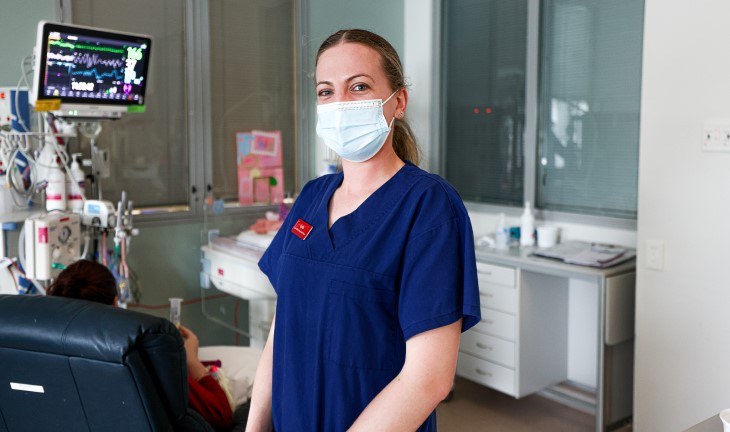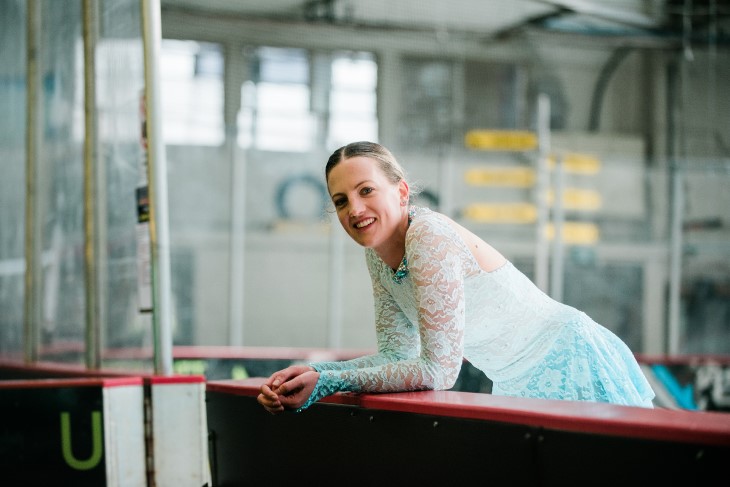Lydia’s story: ‘I was lucky to walk away’ Te kōrero a Lydia: Nōku te waimarie i hīkoi atu noa iho au
A serious concussion took Lydia Markham away from her passion of ice skating and her job nursing newborn babies. But our support helped her get back to doing the things she loves.
Dazed and shaken, Lydia Markham is studying herself in the rear-view mirror of her car.
Fully expecting to see blood pouring down her face, Lydia is relieved she can’t find any.
Her car has just been smashed on the driver’s side by a much larger vehicle but she appears to have somehow escaped without a scratch.
“At the time I thought, ‘Gosh, I’m so lucky to walk away from this unscathed’,” she recalls.
Little did Lydia know that plenty of damage had actually been done – she just couldn’t see it.
She had suffered a serious concussion and had months of recovery ahead of her. Fortunately, we were on hand to give Lydia all the support she needed and get her back to normal life as soon as possible.
“I’d never had a significant accident like this before so I was amazed at all the services ACC provided to help me,” she says.
“It made such a difference to my recovery and meant that I could just focus on getting better.”

Active life comes crashing to a halt
Well known to her friends and family as an ‘active relaxer’, Lydia’s schedule prior to her concussion was jam-packed with energetic activities.
One of the top adult ice skaters in the country, she would train at the rink for several sessions each week, as well as coaching young skaters.
And her working life as a Newborn Intensive Care Unit (NICU) nurse at Wellington Hospital was just as hectic.
With the lives of vulnerable premature babies literally in her hands, Lydia couldn’t afford to drop the ball in the NICU ward during her gruelling roster of 12-hour shifts.
But all that came crashing to a sudden halt one morning in Taupō.

‘It was such a loud bang’
Heading up to Auckland from the capital to visit family, Lydia stopped at the picturesque lakeside town for a bite to eat and a timely break from the lengthy drive.
But the centre of Taupō had been plunged into chaos by roadworks and, amid all the confusion, a jeep came crashing into her compact Nissan Tiida – just a few inches from where she was sitting behind the wheel.
“It all happened so quickly and was over in a few seconds,” she says.
“The main thing I remember is the incredible noise from the impact – it made such a loud bang. The second thing I noticed was my sore head, I kept feeling it to see if the pain was coming from an external injury. That was scary, not knowing what injuries you might discover.”
An unwanted waiting game
Thinking she had managed to avoid serious injury, Lydia caught a bus the rest of the way to Auckland and had an enjoyable weekend catching up with friends and family.
But she had a constant headache and it soon became clear something was wrong. So being diagnosed with concussion on her return to Wellington came as no surprise.
The impact that had on her life was far more of a shock to the system.
“The recovery was a lot longer than I thought it was going to be,” she admits.
“I was initially told it would just be three weeks and then I’d be back to work and my daily activities. But when my headaches and fatigue persisted, I went back to the doctor and that’s when I was told I needed to take things slower for a lot longer.”
That’s the last thing such an active person wanted to hear.
“The most difficult thing about recovering from concussion is the patience you need,” Lydia says.
“The doctors and therapists were able to give me a guideline but there wasn’t a definitive answer that if you do ‘a’, ‘b’ and ‘c’ you’ll be completely better by this date. So I had to change my mindset, learn to go with the flow a bit and not feel down when my recovery was going slow.”

ACC provides a big boost
Lydia was very grateful for our support, which included weekly compensation while she was off work and then a return-to-work programme. We also provided a wide range of rehabilitation services, such as physiotherapy, occupational therapy and counselling.
“Due to the fatigue I had from my concussion and my fear of driving after the accident, it was very important to me to have all my appointments close to home,” she says.
“My recovery manager at ACC was great at listening to my needs and was able to contract a physio that was close to home, which was a massive relief.
“I’m so thankful to ACC for helping me so much on my recovery journey, getting back to fulltime work and all my hobbies. I was very happy that I was able to return to work in a paced and gradual way.
“It’s an incredible feeling being out the other side now with my recovery. I walked out those doors of the physiotherapist office feeling pretty stoked with myself.”

Starring on the ice and in the ward
The hardest part of Lydia’s recovery was not being able do figure skating, which she describes as her happy place.
“The sense of freedom you get on the ice is like being in another world,” she says.
“It’s the place where I destress and feel happy, it fills my cup. I’m not one to sit around all day relaxing so taking it easy for a time was really hard.”
Lydia was soon back on the ice and back to her best, coming first in her category at the national championships.
She was also able to get back to work fulltime – something which is just as crucial to her wellbeing.
“I’m naturally a very caring and nurturing person so caring for the most vulnerable and small babies and their families is the perfect job for me,” she says.
“It’s hard some days but the positive outcomes we see when families get to take their babies home makes my job so worthwhile.”
Getting the ‘zest’ back
Going through her concussion ordeal has given Lydia a new perspective on life.
“I’ve learned never to take your health for granted, accidents happen in the briefest of moments but can be so life altering,” she says.
“When I was really deep in my recovery, I felt like I lost the joyful part of myself. I’m usually a very happy, energetic and positive person.
“So it feels great to be recovered and have the same zest for life I had pre-injury.”
Lydia says the key to recovering from concussion is patience.
“Make sure you get seen by a doctor, even if you think you’re okay. Then listen to the medical advice and give your body the time it needs to heal and recover,” she says.
“Educating the people around you about concussion is also important so people understand a bit about what you’re going through. Having that support when going through something like this is so important.”






